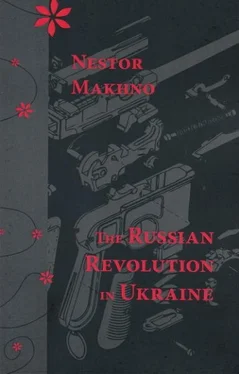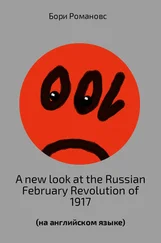Nestor Makhno - The Russian Revolution in Ukraine
Здесь есть возможность читать онлайн «Nestor Makhno - The Russian Revolution in Ukraine» весь текст электронной книги совершенно бесплатно (целиком полную версию без сокращений). В некоторых случаях можно слушать аудио, скачать через торрент в формате fb2 и присутствует краткое содержание. Город: Edmonton, Год выпуска: 2007, Издательство: Black Cat Press, Жанр: Биографии и Мемуары, на английском языке. Описание произведения, (предисловие) а так же отзывы посетителей доступны на портале библиотеки ЛибКат.
- Название:The Russian Revolution in Ukraine
- Автор:
- Издательство:Black Cat Press
- Жанр:
- Год:2007
- Город:Edmonton
- ISBN:нет данных
- Рейтинг книги:5 / 5. Голосов: 1
-
Избранное:Добавить в избранное
- Отзывы:
-
Ваша оценка:
- 100
- 1
- 2
- 3
- 4
- 5
The Russian Revolution in Ukraine: краткое содержание, описание и аннотация
Предлагаем к чтению аннотацию, описание, краткое содержание или предисловие (зависит от того, что написал сам автор книги «The Russian Revolution in Ukraine»). Если вы не нашли необходимую информацию о книге — напишите в комментариях, мы постараемся отыскать её.
The Russian Revolution in Ukraine
The Russian Revolution in Ukraine — читать онлайн бесплатно полную книгу (весь текст) целиком
Ниже представлен текст книги, разбитый по страницам. Система сохранения места последней прочитанной страницы, позволяет с удобством читать онлайн бесплатно книгу «The Russian Revolution in Ukraine», без необходимости каждый раз заново искать на чём Вы остановились. Поставьте закладку, и сможете в любой момент перейти на страницу, на которой закончили чтение.
Интервал:
Закладка:
This news stunned me! I decided to wait for nightfall when Comrade Belenkevich had re-established contact with Egorov’s headquarters.
Around 9 p.m. I sent a telephone message to both the headquarters in Gulyai-Pole and the Revkom, warning them that I had been delayed for an indefinite period.
At midnight I received from Pologi, by way of Tsarekonstaninovka, news that Gulyai-Pole had been traitorously surrendered to the Germans and the troops of the Central Rada.
I didn’t believe this incredible news which bore no signature. However, at 1 a.m. I telephoned Pologi station and asked if they had sent the telephone message at midnight. The operator told me: “Yes, two young men with weapons came in and one of them sent the message you have received. He refused to provide a signature.”
I tried to contact Gulyai-Pole, but I was told that Gulyai-Pole is not answering.
Just as I was getting ready to leave for Gulyai-Pole I received news that Egorov’s headquarters was at Volnovakha, about 45 or 50 kilometres from Tsarevokonstantinovka. I decided to go there, but, when I arrived, I learned the Egorov had already left for Dolya. I telegraphed: “Will Egorov’s headquarters stay long at Dolya?” and received the reply that it had already left for Taganrog.
I left the telegraph office and headed for the locomotive. At this moment Belenkevich’s echelon arrived at the station. Who should jump down from the train but my nephew Foma (son of my oldest brother) who, looking distraught, handed me a letter.
I tore open the envelope and read what follows, which was already out of date:
“Nestor Ivanovich: no sooner had you left Gulyai-Pole than Tikhon Bik also left with some of the nationalists. Two stories circulated here: one said that they were going to follow you and treacherously kill you… So be very careful during your return trip, especially at Pologi station… The second said that T. Bik left with a secret delegation from Gulyai-Pole to the German forces. Immediately after he left, I sent two of our friends to his home. His wife said that he had gone to visit relatives for two days… I have just learned, while writing these lines, that some kind of delegation from the Central Rada and the German armies has arrived in Gulyai-Pole. But it is hidden for the moment and not showing itself to the population. I have taken all measures to arrest this delegation… but am not sure of success. Please return quickly; without your presence we are all sad and depressed…— signed: Your faithful B. Veretel’nik. April 15, 1918.
I began to question my nephew about Gulyai-Pole but my voice trembled and I was overcome with nervous exhaustion. Closing my eyes, I collapsed on a bench, motioning to my nephew that I couldn’t listen to him… A few minutes later I sat in my railway car and left for Tsarevokonstantinovka — Pologi — Gulyai-Pole.
As a result of the retreat of the echelons of the Red Guards, I was held up three or four hours between Volnovakha and Tsarevokonstantinovka. Arriving at Tsarevokonstantinovka, I received more news from Gulyai-Pole, more worrisome still. I read:
“My dear Nestor Ivanovich. During the night of April 16, on a counterfeit order supposedly signed by you, the anarchist detachment was recalled from Chaplino and disarmed en route. All our comrades from Gulyai-Pole, all the members of the Revkom and the Soviet have been arrested and expect to be turned over to the German military and Central Rada authorities to be executed. This treason was directed by the nationalists A. Volokh, I. Volkov, Osip Solovej, commander of artillery V. Sharovskij, and others. Three hours before we were arrested, the Jewish or Central Company was assigned garrison duty. The miserable traitors deceived the Jews and forced them to carry out their vile scheme.
At the time of our arrest we were all disarmed and beaten with blows from rifle butts. Some of our guys who were still armed fired on the enemy.
They say the bourgeoisie is gloating.
Our friend Aleksis Marchenko was apprehended by the leaders of the traitors but he succeeded in escaping. A group of young Jews was send to find him. Marchenko responded with a few shots, threw two or three grenades, and disappeared. But he was captured about 15 kilometres from Gulyai-Pole by Jews from the Mezhirichi colony, taken to Gulyai-Pole, and handed over to the headquarters of the traitors.
They say that the mood of the peasants is downcast. There is hatred towards the Jews for their behaviour.
I am transmitting this letter to you through the sentinel Sh., indicating through whom he can get it to you. If you receive it, come quickly with some kind of force to rescue us.
Your faithful B. Veretel’nik. 16 April. 9 a.m.”While I read this letter from Comrade Veretel’nik, the detachment of Maria Nikiforova arrived at Tsarevokonstantinovka station. I informed her of the events which had just unfolded in Gulyai-Pole. She immediately telephoned the commander of a detachment of Red Guards, a certain sailor Polupanov who was currently engaged in combat with “White Guards” in Mariupol’. Maria Nikiforova proposed that he return to Tsarevokonstantinovka in order to launch an attack against Gulyai-Pole with her.
The sailor Polupanov replied that he couldn’t go back that way and advised Nikiforova to evacuate the Tsarevokonstantinovka — Pologi area before the Germans cut off her retreat.
While this was going on, the detachment of the sailor Stepanov arrived in Tsarevokonstantinovka and, shortly after, the Siberian detachment of Petrenko, composed of two echelons of cavalry and infantry.
Nikiforova asked Stepanov to return with her to Pologi and from there, with the protection of two armoured cars, move on Gulyai-Pole. Stepanov declared that he had attached to his echelon several wagons of fugitives which he was delivering to Comrade Belenkevich. Then he intended to go on to Taganrog. Indeed, he left immediately.
Nikiforova and Petrenko (the commander of the Siberian detachment) decided to return to Pologi and occupy Gulyai-Pole by force in order to free all the anarchists and other revolutionaries being held there. They also intended to gather up the revolutionary armed forces which had been deceived and help them evacuate Gulyai-Pole, or, at any rate, to collect any weapons which might otherwise fall into the hands of the Germans.
While the detachments were preparing to leave, I paced up and down the platform, tearing out my hair and regretting bitterly that I had not sent the detachment formed by the A-K Group from Gulyai-Pole to the Front. Then I received a third letter from Comrade Veretel’nik:
“My dear friend Nestor Ivanovich, the infamous leaders of the treason, terrified by I know not what, have freed me as well as Comrade Gorev on condition, however, that we leave Gulyai-Pole.
Comrade Gorev and I have profited from this circumstance to organize in each sotnia a meeting with the participation of the older peasants. At these meetings, the peasants voted for resolutions demanding the immediate release of everyone arrested, especially the anarchists, and sent these resolutions to the headquarters of the traitors. All our comrades were freed.
Many of the young Jewish workers, and all of the bourgeoisie, with the exception of M. E. Helbuch and Levy, have run off somewhere for fear of vengeance. However no one here has laid a hand on them because all our comrades understand quite well that the leaders of the treason involved them in their scheme in order to set them up for a pogrom.
The Germans are approaching Gulyai-Pole. Our comrades are hiding in groups. The peasants are concealing the rifles, machine guns, and ammunition and are dispersing, some to the fields, some to the neighbouring villages.
Some of my friends and myself plan to remain in Gulyai-Pole up to the last minute. Perhaps we shall succeed in killing Lev Shneider. At the moment our comrades were arrested at the office of the A-K Group, he was the first to enter with the haidamaks. He ripped up our banner and tore up and trampled on the portraits of Kropotkin, Bakunin, and Sasha Semenyuta. This vile act was witnessed by numerous workers and peasants.
Читать дальшеИнтервал:
Закладка:
Похожие книги на «The Russian Revolution in Ukraine»
Представляем Вашему вниманию похожие книги на «The Russian Revolution in Ukraine» списком для выбора. Мы отобрали схожую по названию и смыслу литературу в надежде предоставить читателям больше вариантов отыскать новые, интересные, ещё непрочитанные произведения.
Обсуждение, отзывы о книге «The Russian Revolution in Ukraine» и просто собственные мнения читателей. Оставьте ваши комментарии, напишите, что Вы думаете о произведении, его смысле или главных героях. Укажите что конкретно понравилось, а что нет, и почему Вы так считаете.












